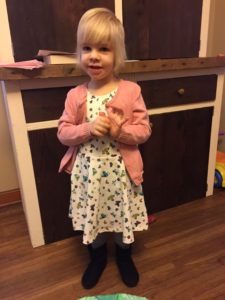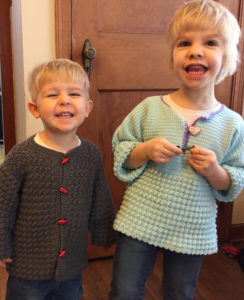Well, the day has finally arrived. It’s the first day of kindergarten registration, and I’m not going. I’m sitting on my couch in my lounge pants with my box of tissue, crying my eyes out. Ironically, I’m sure there are many other moms sitting on their couches this morning in their lounge pants crying their eyes out for the complete opposite reason — they’ve just registered their baby for kindergarten! It’s an emotional decision, no matter which choice mama makes.
When Andrew and I began this discussion process about kindergarten, we were in pretty different places, but as we spent time processing, praying, and talking with many people about our decision, we both had the same idea running through our minds when we finally sat down to discuss this last night: It will not do any harm to give her another year to grow and get ready. While, on the contrary, sending her too soon could set her up for struggle in her academic career. I love when God does this — brings two people to the same page in an important decision.
I have agonized over this decision. Being an educator myself has been both a blessing and a curse. School is, to me, about academics, because I teach high school. (Although in practice I do teach A LOT more than academics to my high schoolers!) But the general notion of school is that it has to do with your intelligence and your learning. And this is why I’ve struggled so — Sophie is completely ready academically for kindergarten. All of her teachers agree that she probably has more academic skills than some little ones who will start kindergarten this fall. Letters, sounds, shapes, colors, numbers and counting, she’s got it. So if she’s academically ready, why not send her??
If you’re new to Sophie’s Story, you may not know that she was born with a condition called hypotonia. It’s not a syndrome, but usually an indicator of a syndrome. In spite of much testing and many different types of doctors, we’ve never found a cause for her hypotonia. She has no known syndrome that we’ve looked at. But she does still have hypotonia. She will always have it. And it can be linked to just about every delay she has experienced.
Hypotonia is a condition of the muscles in which their tone is lower than a typical person’s muscles. I picture it like this: a typical muscle is like a tight, thick rubber band. It is strong and can hold more pressure than a long thin rubber band. Sophie’s muscles are more like those long thin rubber bands, or ones that have been stretched out and lost their tautness. It’s nothing to do with strength; it’s the physical structure of her muscles. When Sophie was a baby, hypotonia caused delays in her gross motor skills like sitting up, crawling, and walking. It also caused her delay in speech, because, even though we don’t realize it, there is great muscle involvement in our speech. Now we see it more in her fine motor development – handwriting, drawing, opening packages and using silverware, dressing and undressing, toileting needs, etc. In addition, because of her speech delay, we see some delays socially. Sophie didn’t learn a lot of social skills at the typical time because she was not able to speak. On top of that, she’s most definitely an introvert.
The educator in me revolts because I know that the purpose of Sophie’s IEP is to remove the barriers that could keep her from being successful academically. Her barriers are physical, and we could have accommodations in her IEP that would allow her to go to kindergarten and be successful. But, as I said before, Sophie will always have hypotonia, and we can never be certain when she’ll be able to master a given skill. If we send her to kindergarten too soon, while her IEP can help her succeed, we’re starting her course for the next 13 years, and thereby giving her less time to succeed at those lingering delays before they become more noticeable to other children. Please don’t think that’s shallow — the way Sophie’s peers perceive her will impact her development, and the way that she matches up to her peers will also effect her own self-image. We want to send her to school as able as possible. So while she is completely academically able, Andrew and I agree that she could only benefit from more time to catch up in some physical abilities, to grow more independent, and to continue growing socially.
Although I really do think this is the very best decision for Sophie, there is still sadness in it for me. I’m struggling to identify where that sadness is even coming from. I feel like I should just be so glad for such an awesome all-day program that she can do next year at preschool. I guess I’m coming back to the realization that acceptance is always a process, at every stage in the game of special needs. I struggle very much with people who misunderstand Sophie’s needs and think that she has mental impairments. I struggle knowing that others may assume she’s not going to kindergarten for intellectual reasons. (Hence my overly lengthy description of our reasons.) But no matter the sadness and the struggle for me, I choose to do what I think is best for Sophie. In my heart, I trust that God sees our year ahead and knows all the things about it that I cannot possibly know. We’ve committed our decision to him, and we’re trusting that he will bless Sophie’s life.



Such good reasons. ❤
Catherine, as former kindergarten teacher, I know your decision will be such a blessing for Sophie. I have had several children over the years, for one reason or another, who truly needed that extra year to grow before going to kindergarten. Being a year older in kindergarten is leas tramatic than repeating first or second grade. The extra year to grow is always best.
Two of my own were home that extra year. Another repeated.kindergarten because we moved from Kettering, Ohio , to Columbus, Ohio and enrolled in Liberty Christian Academy. We both know how advanced the curriculum is at Liberty. The extra year of kindergarten made such a difference ! It was easy to.do because she was new at the school. It would not have been as smooth a transition has she been at the old school. It was such a God thing!
It hurts a momma’s heart, but it is the most wonderful gift you can give your lil one.
I’m so proud of Sophie, she is blossoming more everyday.
Just think how much more blossoming she will in the next year.
<3
GREAT CHOICE! 100% agreement! My first pediatrician told me it would never be a mistake to wait for kindergarten. All my girls waited until 6 and Rachel was very close to 7. Confidence , ease and great success! Lots of advantages in being older! 👏🏻😊❤
I think it’s the right decision based on everything you have shared. All we can do is what we think it’s best. Sophie is intelligent and such a sweet girl. Hugs mama.
Oh Catherine I so love your tender heart!Your sweet Sophie will be fine and I know this decision was guided by our God.Praying peace over you as you settle in on this decision you’ve made for your precious girl!
Good for you. You love her much, and will always make the right decisions for her (and your family).
My 25c worth, because 2c isn’t worth much anymore (idea stolen from your mama, Judy) :
I believe, I sense you heard from the Lord correctly. 🙂
The tears- always tears, yes. And I agree with your reasoning. I also think tears flow from the end of something. It can be either bad or good, but it’s over- the stressful decision-making process, and emotions held in gush out.
My experience: we held all our kids back, and for different reasons, at different times.
One was when entering mid elementary after home schooling, before the dev-delay was diagnosed mid teenage. Of course it didn’t make sense when the child is above average intelligence. So confusing for so long what to do. One was held back repeating 2nd grade, only concern was reading level, excelled in everything else, socially and emotionally too. Another was very mature beyond peers and academics mostly fine, but a couple areas were red flags for me.
Like you, with others’ feedback too, I realized it was better to hold back so when they are older in school and after, they will have more confidence and excel, and because of that peer pressure comparison that naturally happens in any setting.
Your words reminded me of something I haven’t forgotten that i heard once during my struggling years with young children. I added the Christian part:
If you grow up with great academics and knowledge, but don’t have emotional stability, mental and spiritual health, you can’t just take a class to catch up to function, such as to end struggles in employment or relationships. It takes time to heal and grow. BUT, if you are well emotionally, mentally and spiritually, and are missing some academic ability, you will be capable to take a class and learn it. You can catch up.
I also was told that no one will know they were held back, (ok i know the kids check ages) especially after graduation.
It was so worth it for us. You just wait and watch; you’ll find the joy in discovering her academic achievements that spread to all other areas of growth because she’ll be more equal or ahead of her peers than she would have been otherwise. It really made parenting much easier too, to not struggle so much with the one difficulty/delay trying to catch up.
You are just something special. I am so blessed by your sharing.
We held Katy back a year because she had a July birthday. In high school, her best friends were in the grade ahead of her! But that was okay because she did post-secondary at WSU as a senior. Addison waited a year to move on to kindergarten and she is fine. She is on the Austism spectrum, high functioning, and she is wonderful! Super smart and learning. I have never seen a child hurt by being given the extra year. But I have seen those who struggle that just seem to not be ready yet.